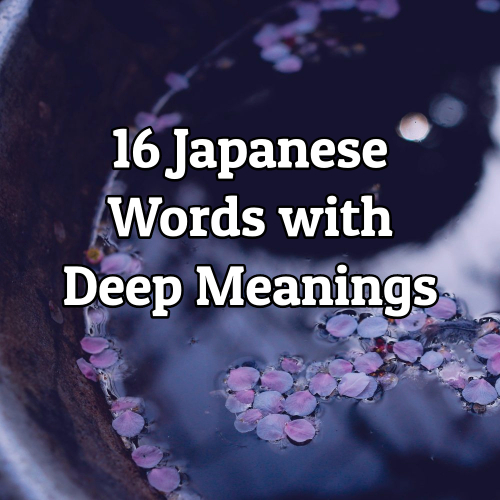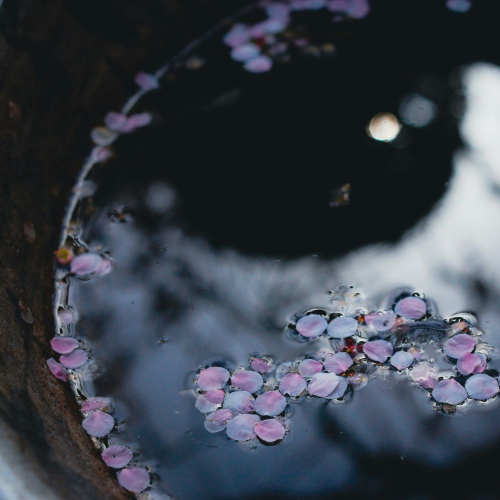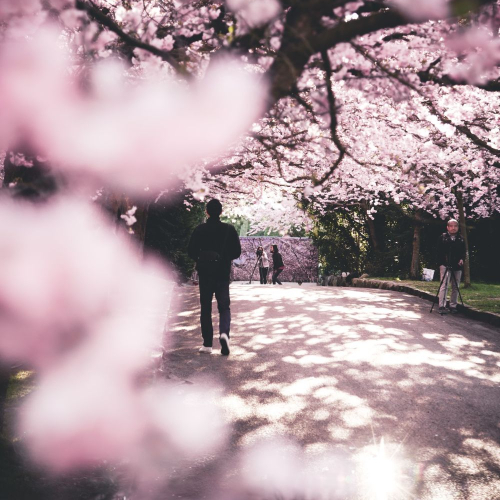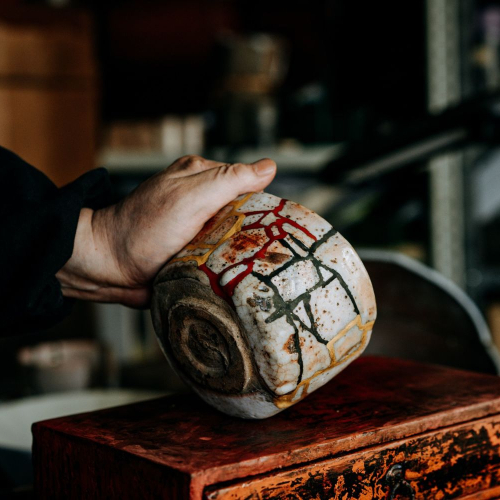The Japanese language has no shortage of unique words.
And you’re likely here exactly just for that — Japanese words with deep meanings.
So, let’s take a look at a few.

 |
Want a bundle of 30+ Japanese PDF Cheat sheets? These colorful and printable PDFs teach you Japanese words and phrases… and they’re free for new learners. Click here to get Japanese PDF Lessons |
1. 侘び寂び
- Wabi Sabi
- Beauty in imperfection
This is a Japanese phrase that represents a deep Japanese aesthetic concept.
Wabi Sabi refers to beauty in imperfection and nature.
Wabi sabi can be found in Japanese art, architecture, and culture.
For example, if you go to a Japanese garden you’ll notice a minimal approach to landscaping that values the natural shapes of the trees.

2. 物の哀れ
- Mono no aware
- Awareness of impermanence
This is another concept that has a deep meaning in Japanese.
Mono no aware is the appreciation and awareness of impermanence.

For example, this can be found in the way that Japanese people celebrate the cherry blossom season.
The cherry blossoms bloom into beautiful whitish-pink flowers but after a short time, all of the blossoms fall off.
This beautiful event can only be appreciated once a year and it must be enjoyed in the moment.
3. 生き甲斐
- Ikigai
- Reason for being
Ikigai is a word with deep meaning which has also become popularized in the West as a way of living.
Its translation can be “reason for being” which can mean that the balance of your work, life, and relationships give your life meaning.
Ikigai represents finding a purpose in life that can make your life fulfilling and happy.
4. 幽玄
- Yuugen
- Subtle, mysterious, and partially perceived beauty
This is a concept that represents the way that not all beauty is seen from the outside.

Mysterious and partially visible beauty can also exist and should be appreciated. It also relates to the subtle interconnection of things that are outside of our understanding.
5. 木漏れ日
- Komorebi
- The light between the trees
This beautiful but deep word represents the light that filters through the trees.
As the trees sway back and forth the light can make a flickering effect while lighting up the translucent leaves.
Japanese people’s appreciation for nature can be seen in this word.

6. 積読
- Tsundoku
- Letting books pile up
Tsundoku represents the situation when you continue to get more books and let them pile up without reading them.
It shows the idea that you want to have more books than you’ve read and an endless mission to acquire new knowledge and wisdom.

7. 森林浴
- Shinrinyoku
- Forest bathing
This is a beautiful and deep word that Japanese people use to describe going out into nature.
Shinrinyoku means forest bathing and it can be a cleansing experience for the spirit.
If you’re looking to be refreshed and gain mental clarity this can be the perfect way!

8. もったいない
- Mottainai
- Wasteful
Japanese people have meticulous recycling and trash disposal rules.
Many things need to be separated when throwing them out.
This can also be seen in the word mottainai which means wasteful.
The idea that something is wasteful is strongly ingrained in Japanese people’s minds.
Whenever eating, it is considered polite eat every single grain of rice in the bowl.
9. お疲れ様
- Otsukare sama
- Good work
This is an interesting word with deep cultural meaning because it recognizes the way that Japanese people value hard work.
Whenever people are done with work they say otsukare sama to recognize their efforts.
It is a great way to end the day and keep motivated.
10. 金継ぎ
- Kintsugi
- Repairing with gold
This relates to the Japanese idea of wabi sabi and celebrating imperfection.
This is a process where broken pottery is put back together using gold or silver lacquer.
The lines of the cracks of the pottery gain a fresh appearance highlighted in gold and silver.
The flaws of the object turns back into beauty.

11. 渋い
- Shibui
- Simple, subtle, unobtrusive
This is the concept of humility, simplicity, and subtleness that can be found.
It is an interesting and deep word because it is hard to translate.
Shibui can be similar to the word classy, but it is almost always an understated and elegant style.
It’s often used to describe design and clothing.
If you had a classy dark-colored suit it could be considered shibui.
12. よろしくお願いします
- Yoroshiku onegaishimasu
- Please take care of me
This is an important phrase in Japanese because it conveys the idea that you will burden others.
When people ask someone to do something or meet for the first time, they will say this word.
This thanks the other person in advance for any favors they may do for them in the future.
13. 懐かしい
- Natsukashii
- Nostalgic
This is a beautiful and deep word because it conveys the idea of nostalgia.
In Japan, nostalgia is an important concept.
Many vintage cafes and shops have been running for hundreds of years and are appreciated for their commitment, consistency, and history.
14. 心
- Kokoro
- Heart
This is the word for heart as a spirit and it represents someone’s consciousness, soul, or emotions.
It is a deep word because in Japanese there are two ways to say “heart”. S
hinzou is the one for the physical organ, and kokoro for the spiritual sense of the heart.
If someone has a good heart, you would use this word.
14. おもてなし
- Omotenashi
- Hospitality
The idea of hospitality is important to Japanese people.
Compared to Western culture the Japanese highly value hospitality and will go above and beyond to display it.
For example, if you stay at a Japanese inn the workers will be active in making the stay enjoyable by listening to every request and making sure that you have a great time.
The same can also often be seen on the streets if a foreigner is lost. A Japanese person might guide them to their destination.
15. 和
- Wa
- Harmony
Wa is an important concept and word with deep meaning.
The word wa can represent the idea of Japan or Japanese culture itself. It also means harmony and it is an important concept for Japanese aesthetics and art.
For example, if you’re eating Japanese food it is called washoku, if you’re staying in a traditional Japanese room it is called washitsu.

16. 精神
- Seishin
- Spirit or mind
Seishin is a powerful and deep word because it means the sense of spirit and mind.
Japanese people use this word concerning sports and martial arts as you need to have a strong spirit and mind to be successful.
There is also a phrase to toughen up your spirit which would be seishin wo kitaeru.
Just as you need to train your muscles Japanese people believe in strengthening mental power as well.
Back to You
These are just a few Japanese words with deep meanings…
There are a lot more to add to this list.
Which one was your favorite?
What else would you like to see here?
Leave a comment!